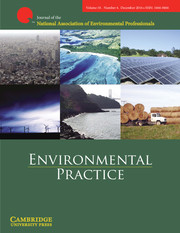Re: Your Request for Input—Editorial on Environmental Professionals and Climate Change
To: John H. Perkins, The Evergreen State College, Olympia, WA 98505
Dear Dr. Perkins:
I read your September 2006 editorial on climate change with great interest. I, too, went to see Al Gore's “An Inconvenient Truth” and immediately recommended to others (fellow Environmental Professionals, friends, family, co-workers, and legislators) that they should make an effort to see it. I believe it should be shown more widely throughout our elementary and secondary school systems … as it is this next generation (future voters, scientists, and parents) who will inherit what seems to be most imminently coming their way.
You asked how climate change would affect the work of Environmental Professionals? For one, I believe any of us dealing with land issues, particularly land near oceans and rivers, will have our priorities rearranged to focus on the impacts to infrastructure, transportation modes, and socio-economic matters. Just thinking about the potential of rising ocean levels and looking at our many cities that lie next to the oceans, my head spins with scenarios. I am working in the aviation/NEPA arena and, as you know, there are any number of major airports that lie near major rivers and ocean front areas. Rising water levels could cripple air and ground transportation in these areas, have devastating impacts on population centers, and create astronomical economic stress on national and international levels.
Your closing paragraph raises two issues for the NAEP [National Association of Environmental Professionals]: (1) what does our Code of Ethics require of us? and (2) what should Environmental Practice publish to help the NAEP take a leadership role in climate affairs?
In response to your issue/question #1, our Code of Ethics tells us in paragraph 2, “It is their [Environmental Professionals'] duty to interest themselves in public welfare, and to be ready to apply their special knowledge for the benefit of mankind and their environment.” If ever we should be standing up, it is now. While climate change is a global matter, I believe we, as Americans and Environmental Professionals, should bring the need for the development of a real National Energy Policy, truly a matter of public welfare, to the forefront in this country.
In response to issue/question #2, I believe we should publish factual observations and studies about the observed changes and resultant impacts that are already documented in different parts of the world. In addition, we should continue to publish thought-provoking pieces like Charles Eccleston's (same Environmental Practice issue as your editorial) titled “Towards a National Energy Policy.” While I have not been a proponent of nuclear energy and take issue with those who state that there is insufficient time for developing reliable sources of renewable energy (wind, solar, tidal, etc.), I believe we need to publish more pieces that focus the readership on the energy issue. The fact that this nation has no real Energy Policy at this time should be a matter of grave concern to all of us.
In closing, I would like to share a thought expressed in Thomas Friedman's book, The World is Flat: Wouldn't it be grand if our country's leaders put the development of a real Energy Policy (one that would wean us away from our oil dependence) on a national priority level akin to what President Kennedy put this country to task on in order to become the world leaders in space exploration/putting a man on the moon??
I believe Al Gore is correct … we do have the know-how to develop oil-independence; our leaders simply don't have the will to go there.
Maybe we Environmental Professionals can help move this country in a way that will make a difference!
Thank you for doing the editorial.
Sincerely,
Edward S. Gabsewics, CEP, York, PA, (e-mail) esg353@comcast.net


